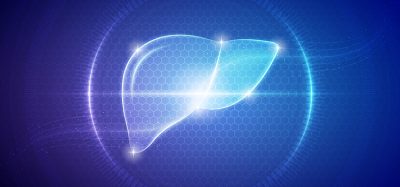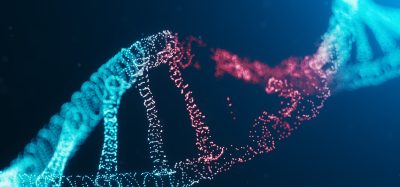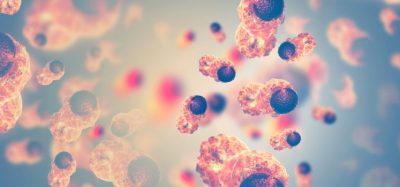Treating peanut allergies in mice with mRNA delivering nanoparticles
Posted: 10 April 2023 | Izzy Wood (Drug Target Review) | No comments yet
UCLA have developed technology using nanoparticles that deliver mRNA to liver cells, that could provide a platform to fight allergies.
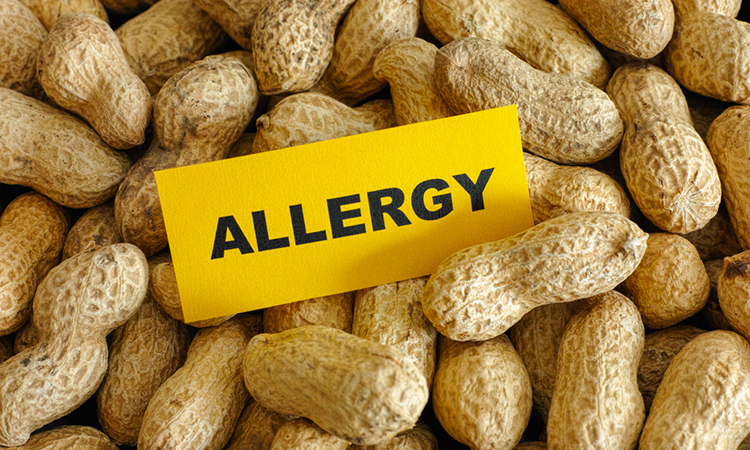

Currently, there is only one approved treatment that reduces the severity of the allergic reaction, and it takes months to kick in. A group of University of California (UCLA) immunologists, US, is aiming to change that.
Their study, published in ACS Nano, created a first-of-its-kind nanoparticle that delivers mRNA to specific cells in the liver. Those cells, in turn, teach the body’s natural defences to tolerate peanut proteins.
In testing in mice, the nanoparticle not only reversed peanut allergies, but also prevented them from developing.
Peanut allergies affect 1 in 50 children, and the most severe cases lead to a potentially deadly immune reaction called anaphylactic shock.
“As far as we can find, mRNA has never been used for an allergic disease,” said Dr André Nel, the paper’s co-corresponding author, Professor of Medicine and Director of Research at the California NanoSystems Institute at UCLA. “We have shown that our platform can work to calm peanut allergies, and we believe it may be able to do the same for other allergens, in food and drugs, as well as autoimmune conditions.”
The researchers focused on the liver for two reasons:
- The organ is trained not to respond to every challenge because it is regularly bombarded with foreign substances, including allergens.
- The organ is home to cells called antigen-presenting cells, which collect foreign proteins and train the immune system to tolerate them rather than attacking when they are detected.
In previous studies, the team found that a nanoparticle delivering a carefully selected protein fragment, called an epitope, to the liver reduced symptoms of dangerous egg allergy in mice. They identified one epitope that alleviated peanut allergies in mice when delivered to the liver via a nanoparticle.
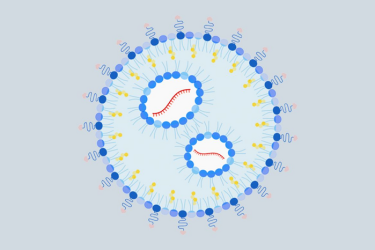

The UCLA-developed nanoparticle has sugars on its surface that target specific cells in the liver (dark blue and pink shapes) and an mRNA payload that encodes for a specific protein fragment (red).
(Credit: Nel lab/UCLA)
“If you are lucky enough to choose the correct epitope, there is an immune mechanism that puts a damper on reactions to all of the other fragments,” explained Nel.
The scientists improved on the design of their previous nanoparticle by adding a sugar molecule on its surface that specifically binds to antigen-presenting cells. Using mRNA was another step forward.
In the upgraded nanoparticle, the researchers designed part of the mRNA payload to encode the selected— in this case, the peanut protein. Using mRNA makes it easier to load the nanoparticle and eliminates the complications that come with including more than one epitope, an advantage that may expand the scope of application. For instance, multiple epitopes might be needed to address certain other allergies, or multiple allergies.
To evaluate whether their upgraded nanoparticle would prevent peanut allergies, the researchers gave it to six mice in two doses, a week apart. Another group of six mice got a nanoparticle with the same mRNA payload, but with no targeting sugar on its surface; six other mice got the upgraded nanoparticle but with mRNA inside that didn’t code for any protein or epitope; and a third group of six got no nanoparticle at all.
Starting one week after the second dose, they fed the mice a crude peanut protein extract to sensitize them to the peanut allergens. Another week later, they exposed the mice to peanut protein to trigger anaphylactic shock.
The scientists repeated the experiment, changing the order of operations — so that mice were sensitised to peanut protein before receiving the nanoparticle.
In both versions of the experiment, the scientists measured the levels of specific immune cells as well as certain antibodies, enzymes and cytokines, which confirmed that the upgraded nanoparticle had increased the animals’ tolerance for peanut protein.
He added that substituting an mRNA payload coding for different epitopes opens up the potential to adapt the nanoparticle for other allergies and autoimmune disorders.
Related topics
microRNA, Nanomedicine, Nanoparticles, Nanotechnology, Targets, Technology
Related conditions
Peanut allergy
Related organisations
University of California (UCLA)
Related people
Dr André Nel




